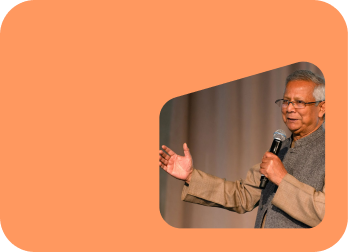Africa After Rio+20
--, --, --
Author- Professor Muhammad Yunus & Michel Camdessus
Published on- The World Post
Date- June 22, 2012
It is clear that Rio+20 has not delivered what many of us had hoped. Twenty years after the world committed itself to increased efforts to tackle inequality, hunger and environmental destruction at the first Earth Summit, we seem to be moving in the wrong direction.
It was a major disappointment that Rio+20 saw a lack of progress on defined and measurable sustainable development goals. Rather than agreeing new global action to meet existing equity commitments, many seem to have been diluted or have disappeared.
Instead, we saw a wasted opportunity to build on the way the MDGs (Millennium Development Goals) have focused global attention on the needs of the extreme poor. We are pleased to see that the Rio+20 statement recognized the need for increased efforts to meet the MDGs by 2015. But what is lacking is any commitment to timetables or outcomes to achieve and extend this ambition.
This is a huge setback for Africa and other developing regions of the world. As the latest report from the Africa Progress Panel highlighted, the continent continues to suffer from deep, persistent and enduring inequalities. We called for agreement on an international drive to close the gap where the MDGs are going to be missed and to continue progress beyond 2015. This has not happened.
While new efforts to meet the MDGs and to extend them beyond 2015 are vital, they are also not enough on their own. They need to be complemented by practical commitments to address the combined demands of rapid population growth, increased consumption of scarce natural resources, climate change and environmental degradation on our world.
This puts the failures of the global food system high on any agenda for action. Again Africa’s citizens are paying a very high price for these failures. Over 200 million people, the highest proportion of any region, face food insecurity in sub-Saharan Africa.
Ensuring that Africa can meet present and future food needs requires agricultural productivity and small-holder farmers, many of whom are women, to be put at the centre of economic growth strategies. But while stressing the importance of agriculture, the Summit again failed to agree on provisions for the urgently needed investment in small-holding farming and climate adaptation assistance.
Africa is forecast to be the continent worst hit by climate change. Increasing harvests and food production in these challenging circumstances requires a major commitment, by governments within and outside the continent, to fund a climate-resilient Green Revolution in Africa.
This will also require increased international co-operation in managing scarce water resources — essential in Africa whose rivers cross many national borders. So it was alarming to see the Rio Summit apparently giving renewed emphasis to national sovereignty on this critical issue.
Nor did we see the steps needed to strengthen land rights protection and introduce global standards for land acquisition. In the last decade, speculators have bought up over 134 million hectares of land in Africa — an area larger than the UK, France and Germany combined. All too often, it is the poor people who live on this land whose livelihoods and futures are threatened.
None of these ambitions can be met if wealthier countries use the excuse of the global financial crisis to break their promises to the poorest on the planet. The Rio statement rightly calls on Governments to keep their word on all ODA commitments. Yet over 40 years after the developed world first committed itself to spending 0.7 percent of its annual national wealth on aid, only five countries have met this target.
Rich countries, meanwhile, spend 80 times more in subsidy to their own farmers than they do in supporting agriculture in the developing world. Promised money to help poorer countries protect their citizens against climate change has simply not been delivered. This failure helps explain why many developing countries are reluctant to sign up to new international goals.
We understand that national budgets, in developed and developing countries, are under intense pressure. It is why we need to examine new funding mechanisms such as levies on international air transport or bunker fuel taxes. In particular, we agree with our colleague, Mr. Kofi Annan in calling for a financial transactions tax as an innovative method for mobilizing development and climate change finance.
Despite the missed opportunities at Rio, it is not pessimism but action we need. We saw support for the importance of green growth strategies for eradicating poverty, reducing inequalities and upholding human rights. If countries adopt the green accounting measures, endorsed by the UN and World Bank, alongside more traditional economic data, it will be a major step in driving sustainable development.
Above all, in a world more inter-connected than ever, it is becoming clearer by the day that only through multilateral co-operation can we redress unjust and persistent inequalities, world hunger and environmental destruction. But the longer we ignore this truth, the larger these challenges will become.
Source - http://www.huffingtonpost.com/muhammad-yunus/rio20-africa_b_1619492.html




 SOCIAL BUSINESS
SOCIAL BUSINESS 

 Events
Events News
News

